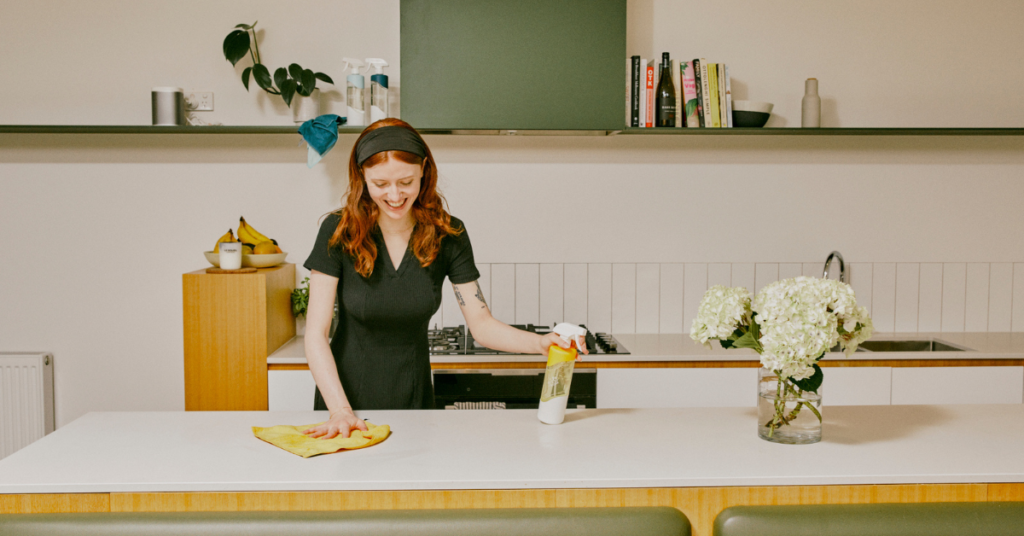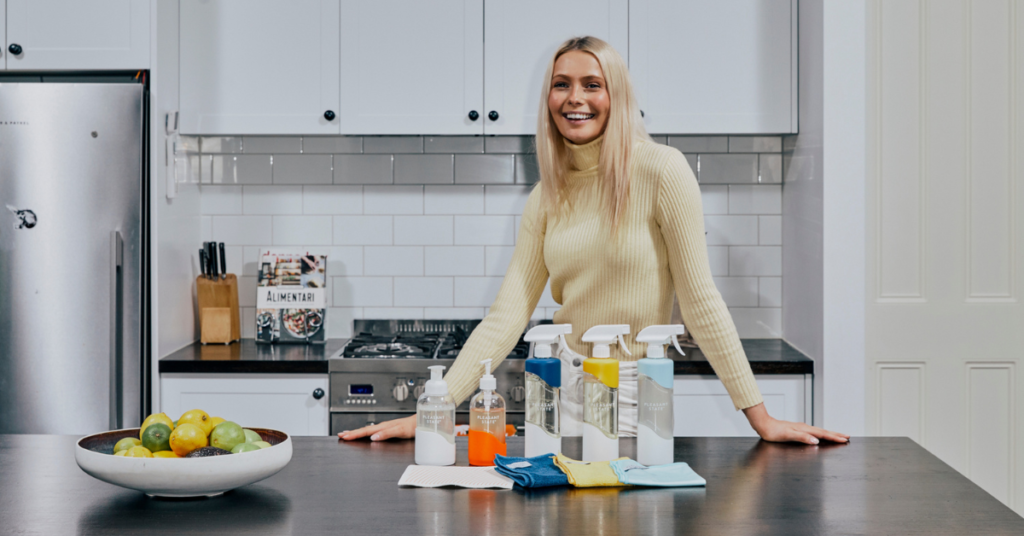Everyday cleaning products are made of more than 97 per cent water, packaged in single-use plastic and filled with toxic chemicals that are known carcinogens, allergens and sensitisers.
And Pleasant State is trying to change that. This female-owned Australian start-up is revolutionising the cleaning industry with its just-add-water home care products that are preventing thousands of plastic bottles from going to landfills.
Pleasant State achieved B Corp Certification last year and to celebrate, we chatted with the team to hear more about their journey towards a better future.

Image: Pleasant State
Can you tell us more about what Pleasant State does?
Pleasant State is working towards a world free of toxic cleaning chemicals and single-use plastics with our range of ethical products that make home care a form of self-care.
To address this issue, we developed Australia’s first just-add-water cleaning bars that dissolve to make a multi-purpose, bathroom and glass cleaner, and hand and dish soap, reducing the need for single-use plastic packaging and toxic chemicals in our homes and waterways. Think of Berocca but for cleaning!
Developed and manufactured in Australia and tried and tested against the best household brands, Pleasant State’s cleaning bars are super effective.
Our solution doesn’t just remove the need for single-use plastic packaging – it stops the need for transporting around litres of water, contributing to unnecessary greenhouse gas emissions.
We’re a female-owned Australian start-up that prioritises social and environmental impact over profit.
For every product sold, we donate 1 per cent of sales to our charity partner, Take 3 For The Sea, helping clean up our oceans. Our entire range of products has been independently verified as safe, ethical, responsible, and sustainable by Clean & Conscious Awards 2021 and 2022, and we’ve been recognised as winners of the 2022 Trans-Tasman Innovation and Growth Awards and as State Finalists in the 2023 Telstra Best of Business Awards.

Image: Pleasant State
Why did you want to certify as a B Corp?
Achieving B Corp Certification has been a goal for us from day one, especially for our Co-Founder Ami Bateman, who has worked hard to make this happen.
As Ami says, “Throughout my MBA and entrepreneurship studies, I was curious as to why we never covered how to build an ethical start-up business to ensure that no matter how big the company got, it always made decisions with people and planet front of mind.”
To ensure we balance people, planet and profit, we looked for an ethical model to use as the foundation of Pleasant State’s business model.
The B Corp model quickly became the obvious choice, and we’ve been living and breathing its principles ever since. So, achieving certification was a proud moment for all of us.

Image: Pleasant State
What makes your B Corp unique as a business? Tell us some of the areas where you have the biggest impact, or some of the little changes you’ve made to make a difference.
Our dissolvable cleaning bars are a game-changer in the cleaning industry. As a female-owned Australian start-up, we focus on a bigger purpose rather than just profit.
Since we started shipping our products in March 2021, we have made an impact in close to 20,000 households in Australia and New Zealand, preventing over 123,000 plastic bottles from ending up in landfills, generating 61,500 litres of toxin-free cleaning, and donating over $43,000 to charity.
We consider the triple bottom line in all aspects of our business, always looking for the best and most sustainable solutions, asking questions, pushing boundaries and demanding the best from our partners.
For example, when we found out that our glass and silicone bottles and triggers would be delivered in individually wrapped plastic bags, we worked with our bottle manufacturer to come up with a more sustainable solution. It cost us a little more, but it meant we could save 180,000 plastic bags.
This taught us that it’s important to always ask questions and that there’s often a more sustainable solution out there.

Image: Pleasant State
B Corps want to help transform our economy to one that is inclusive, sustainable, and regenerative. What business practice do you want to see become the norm?
At Pleasant State, we want to see business practices that reform the home care industry. So that ingredients need to be disclosed in a similar way to the beauty and food industries.
Our dissolvable cleaning bars not only reduce single-use plastics in home care products but are also non-toxic, which is crucial to our customers’ health. This is close to the heart of our Co-Founder, Ami, who suffered chronic daily headaches for two years and discovered that the products she was using in her home were emitting volatile organic compounds (VOCs), resulting in her chronic health condition.
Indoor air pollution is a significant environmental risk, ranked in the top five by the EPA and the CSIRO, costing Australia an estimated $12 billion annually. Beauty, cookware, and cleaning products, including their plastic packaging, contribute significantly to VOCs, and the home care industry is largely unregulated, meaning manufacturers don’t need to disclose their ingredients.
Most cleaning chemicals are derived from petroleum and contain endocrine-disrupting chemicals (EDCs) that have been linked to reproductive issues, cancer, thyroid problems, metabolism and cardiovascular endocrinology.
We hope that the home care industry becomes more accountable, similar to the beauty and food industries, by requiring ingredient disclosure on products.
This will empower consumers to make informed decisions when purchasing home care products that are being sprayed all over their homes and food surfaces.

Image: Pleasant State
Was there a B Corp that inspired you to certify, or one that you look to for inspiration?
Where do we begin? There are so many incredible B Corps that inspire us daily.
From Patagonia to Allbirds and more locally, Who Gives A Crap and Boody. These brands have had a big impact on Pleasant State, and we’re proud to be part of this community.
We’re excited to work with other like-minded brands to learn from each other and drive significant change.

Image: Pleasant State
Do you have any tips for aspiring B Corps about the certification process?
If your business is in its early days, it’s important to start working on your certification from the outset. This way, you can use the B Corp model as a framework for your business and a resource to turn to when you need to make decisions. It will save you a lot of time and energy as it will mean you won’t need to go back and update your business model when you apply for the B Corp Certification later on.
A big thank you to Pleasant State for taking the time to share its journey with us. To find out more and explore their range of products, visit: www.pleasantstate.com

